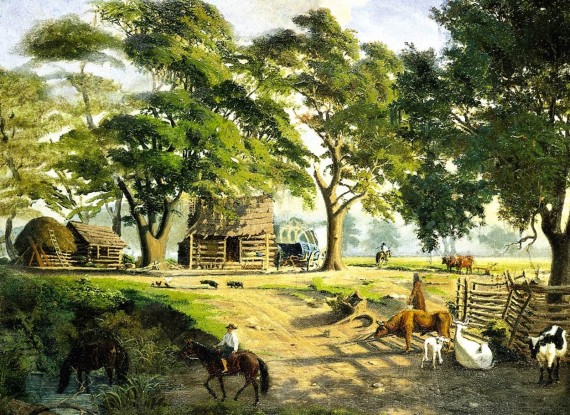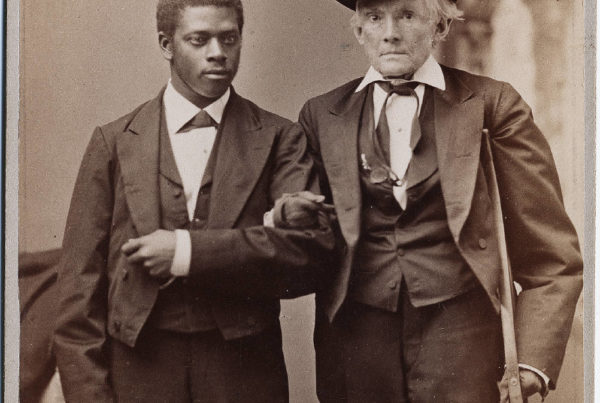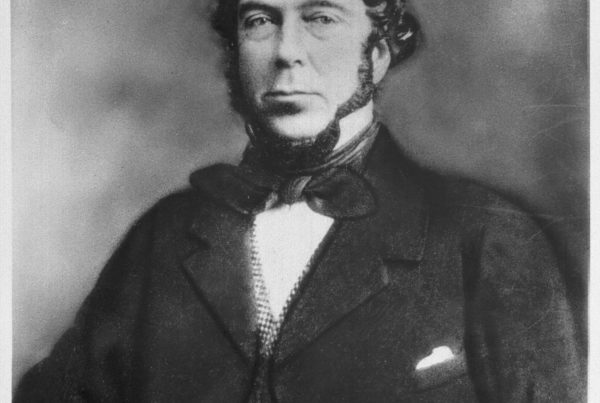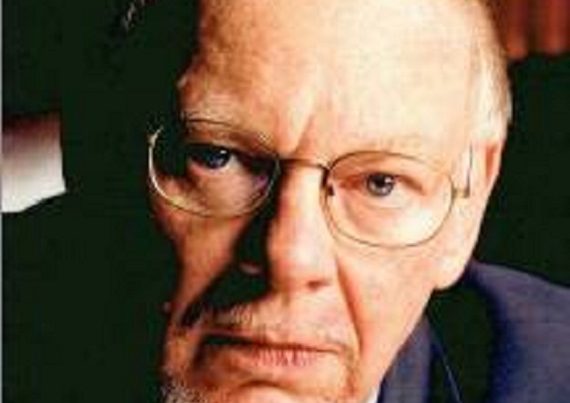When I first heard of the topic “Small is Beautiful,” I thought of the wonderful motto of Chilton Williamson’s friend Edward Abbey: “Growth is the Enemy of Progress.” Abbey went right to the heart of the matter. The false but pervasive premise of American life is that progress and growth are the same thing and are defined and justified by increasing material wealth, which used to be called prosperity.
I would like in this brief time to suggest a few contrary convictions about this matter. Not only does growth not necessarily result in progress, it does not necessarily result in prosperity either. There is a problem with the measures we use for national and individual prosperity. Under today’s conditions, the Economic Nation is an abstraction as far removed from flesh-and-blood Americans as is the Proposition Nation which supposes that anyone is an American who can sneak over the border and give lip service to a few carefully selected slogans.
This year is the 75th anniversary of publication of I’ll Take My Stand, the Southern Agrarian Manifesto. In a work that still commands attention, those Twelve Southern gentlemen made a critique of what they called “industrialism” and its theme music, the Philosophy of Progress. They were not really opposed to progress—to things getting better. What they were condemning was what Abbey called Growth—the American commitment to the proposition that bigger is better, with no end in sight to the building of ever more gigantic institutions in which the real ends of human life were ever more compromised.
The picture becomes clearer when we look at the neglected sequel to I’ll Take My Stand, Who Owns America? In the sequel Northern and British writers joined the Agrarians in pointing out, to wanderers in the economic wilderness of the 1930s, a humane path between the twin Leviathans, capitalism and socialism.
They were severe critics of capitalism but at the same time champions of private property, which they regarded as the basis of civilization and liberty. How could that be?
They found defects of existing capitalism in two main areas: the abstractness of property and thus of responsibility; and a proclivity toward inhumane scale. To own shares of stock in a corporation, that may be traded off before the end of the day, is a qualitative departure from having personal responsibility for production and payroll. As the Agrarians and Distributists saw it, ownership and work were alienated and those who used to be our labouring fellow countrymen are now merely disposable factors of production. Capitalism had made property both abstract and too concentrated, though every sage from the ancients to the American Founders had taught that widespread ownership of real property was the only basis for a free and prosperous society, which inevitably was poisoned by great concentrations of wealth and the enervations of luxury.
The abstraction of ownership has proceeded much further today when ownership has been removed several steps even further from work and responsibility and is globalized—devoid of roots in any human community. In exactly what sense can we claim that a rising stock market index signals rising prosperity for Americans, individually or nationally? What exactly does it measure? Who owns America?
The Agrarian/Distributist enemies of what they called capitalism also decried the gigantism which had accompanied its progress. Some presented hard evidence that great factories did not come into existence because they embodied economies of scale discovered by the free market. Indeed, a series of small factories scattered across the countryside could be shown in many cases to be more efficient. The overgrown, inhumane scale of workplace, living space, and mass culture that dominated American life had resulted from choices—choices often made in the grip of a false assumption that bigger is always better. This assumption is not just an imposition on an unwilling people, however—it is, alas, a deeply rooted aspect of the American, or if I may the Yankee, national character.
The choices had been made because the wielders of big capital had also wielded the biggest political influence. Hamilton’s vision of government of, by, and for the wealthy had been realized. This is a central fact of American history and American existence that seldom reaches public notice. Wendell Berry has shown convincingly how Big Government and Big Business conspired to eliminate the family farm and foster agribusiness. It is equally true that the great industrial and financial fortunes of the 19th century were not created by the free market and the spirit of entrepreneurship, but by the collusion of politicians and capitalists. John D. Rockefeller considered himself a public benefactor. As he saw it, he had rationalized a chaotic oil industry under his benevolent consolidated control.
He had achieved this primarily by bribing legislatures and other slick maneuvers to gain control of the railroads, depriving independent producers of distribution and forcing them into his cartel. It had little to do with production of useful goods and services. Nobody hated Rockefeller more than the real free-market entrepreneurs who had risked and worked to get the oil out of the ground and make it useful. What kind of commonwealth is it where one Rockefeller carries more weight than any millions of us plain folk.
Rockefeller represents the American way, state capitalism. One of many strange delusions that mark American public discourse is the idea that the Republican party is the party of free enterprise. The Republican party is and always has been the vehicle of state capitalism—by which I mean concentrated private ownership and profit fostered and protected by government. The Republican party initiated and fought the bloodiest war in American history for the purpose of doing away with free trade and free banking, of fostering the mass importation of cheap foreign labour, and of guaranteeing that big capital would get the lion’s share of the vast available natural resources in the gift of politicians. What else was the politics of Hamilton, Clay, and Lincoln about? Our state capitalist economy is very far from the ideal and the spirit of free enterprise, but it is often what is meant when we hear capitalism praised or condemned.
It is true, nonetheless, that American is a great exhibit of the success of free enterprise. Because of our abundant resources and the talent and energy of our people, a vast, productive and innovative free enterprise economy has flourished—underneath and in spite of government and Big Business.
We used to know what was meant by prosperity. It meant a general feeling of sufficiency and ease. By that measure we are not very prosperous. We have statistical abstractions about per capita income or net worth, which perhaps show more prosperity than in distant times, but they also show trends that do not offer comfort to any but the tiny fraction of the very rich.
I began asking questions about progress after forty years of viewing the condition of the people in the four Southern towns in which I have lived and others that I know about. The South has been for a long time out-Babbitting Babbitt, engaged in a desperate struggle to import prosperity by fawning upon outside capital. We have flaunted our cheap resources and our cheap labour, offered special benefits of tax breaks and tax-paid infrastructure. We have even played along and flattered Yankee capitalists’ pretences of gentility and humanitarianism. One thing we actually have accomplished is to shift much of the costs of production to the local population in return for jobs with regular paychecks. It is easy to understand why we did this. Our wealth had been reduced by invasion and a century of economic exploitation by federal legislation. We were poor and without capital, and farming did not pay and a promise of regular paychecks looked good to the local bankers and developers.
Are we more prosperous now? Perhaps we are a little more so, though in the South people are still paid about 75 per cent of what the same job brings in the rest of the country. Perhaps the per capita income figures for the communities I mentioned are a little higher than a few decades ago. Is the community better off? I don’t know and there is no way of knowing, because it is no longer the same community or indeed any real community. There can be no real answer because there is no longer any real community to be measured.
I have observed certain things about our Growth and Progress in the South. Nearly all of the best paying and even middle-paying of the new jobs have been filled by people who have been imported from outside the region along with the capital, while the low-paying jobs go to the natives. Newcomers get the white collar jobs. One does not encounter a blue-collar worker who is not a native white, or occasionally, black man. The affluent newcomers, usually calling themselves Republicans, demand public services at the munificent level to which they are accustomed, and often, though not always, show contempt for all local ideas, manners, and traditions.
Let me pause in my Yankee-bashing and thank Heaven here for the many good Northerners have joined us in good faith and enriched the South throughout our history. The old Southern Democratic county commissioners knew of their people’s hard life and were easy on taxes. The affluent newcomers have no such consideration despite the fact that they presumably left the North to get away from the taxes their demands had imposed there. Taxation and inflation, in my observation are literally destroying the prosperity and opportunity for upward mobility of most native working and middle class people.
In the county in which I live, families who have lived well off of the same land since the late 1600s have been forced to sell out because the taxes on their farm land are assessed at suburban values. In one of our South Carolina cities, newcomer residents of a rich gated community have demanded an undeveloped green space between themselves and the natives—supposedly for reasons of environment and civic virtue. The result has been to destroy the value of the property of hundreds of natives, property which their families settled almost three centuries ago and which is their only capital. I know of a long-flourishing farm community that has been destroyed by pollution from one of the sought-after industries, with no compensation as yet.
Other Southern communities that sold out for payrolls have now had the payroll (much reduced, of course) moved to Mexico. The same has happened to many Northern communities. But there is a difference. The Southern communities never had the benefit of a long prosperous period that the North had before the plug was pulled. Or even worse, Mexicans have been imported for the jobs. A seldom-commented upon fact is that Hispanics are nearly ten per cent of the population in the Carolinas and Georgia and increasing with no end in sight. I doubt if this a sign of our prosperity—rather the contrary. I know it is a disaster in every other respect than the economic.
I recently saw a statistic that unemployment is 11 per cent in California. What does this mean when the very definition of California lacks stability because of ceaseless inflow of foreigners. How do we know how many Americans do not have medical insurance when we don’t even know who is an American?.
But the main point I want to leave from our discussion of Small is Beautiful—the small is beautiful and the big is not. In a regime in which people are interchangeable consumers and factors of production, as similar and as movable as a row of checkers, statistics about prosperity of an individual or a community or a state or of the United States have no meaning. All we can really do is protect and nourish that small and beautiful thing that is ours, if we are lucky enough to have it.
SOURCE: A slightly different version appeared in Chronicles Magazine.







